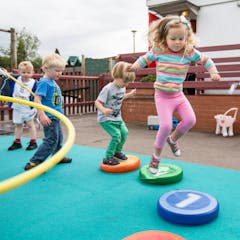
Articles on Early years education
Displaying 1 - 20 of 50 articles

Tooth decay is the most common reason why young children aged from five to ten are admitted to hospital.

Changing attitudes to maths from the start of education can lead to more success later on.

The advantages and disadvantages of summer-born children entering school outside their peer group.

Policies which focused on improving children’s experiences while developing the early years workforce may have looked very different.

Despite a huge investment in preschool funding, school readiness scores have remained flat for more than a decade.

Large for-profit nursery groups may be at increased financial risk.

A chasm has opened up between early childhood learning and the first years of compulsory schooling. Kids go from playing to being tested in the blink of an eye, and their learning is poorer for it.

Childcare is central to families being able to sustain working lives. But insufficient government funding and a complex web of for-profit companies means many are losing out

Planning outdoor early learning and child care has implications for training and recruiting educators as well as for planning, developing and funding physical spaces.

Not being able to attend nurseries due to lockdown has affected children’s growth in emotional, linguistic and physical terms. The longterm effect could heighten inequality

From nursery closures to families self-isolating, COVID has disrupted children’s access to pre-school care. This impacts their development, and their parents’ ability to work

Children who started school in autumn 2020 needed more support than in previous years.

Nurseries play a hugely important role in local communities.

State-funded nursery schools now fill significant gaps in welfare provision in England.

When young children are active, their brains and bodies develop the ABCs of “physical literacy,” a key developmental foundation. A new program from University of Winnipeg can help.

Remote contact with families in the coronavirus emergency is critical, but learning on a screen is not how young children will gain the foundational and developmental skills they need.

Math is not primarily about numbers, but about thinking. It all begins with parent-child conversations about mathematical ideas.

A brief guide for teachers and parents on tech in the classroom.

Why does childcare work have such a status problem in Britain?

Overall, we’ve seen huge improvements, particularly for children aged three to five years, but now we need a universal approach to quality education and care for our youngest children.
